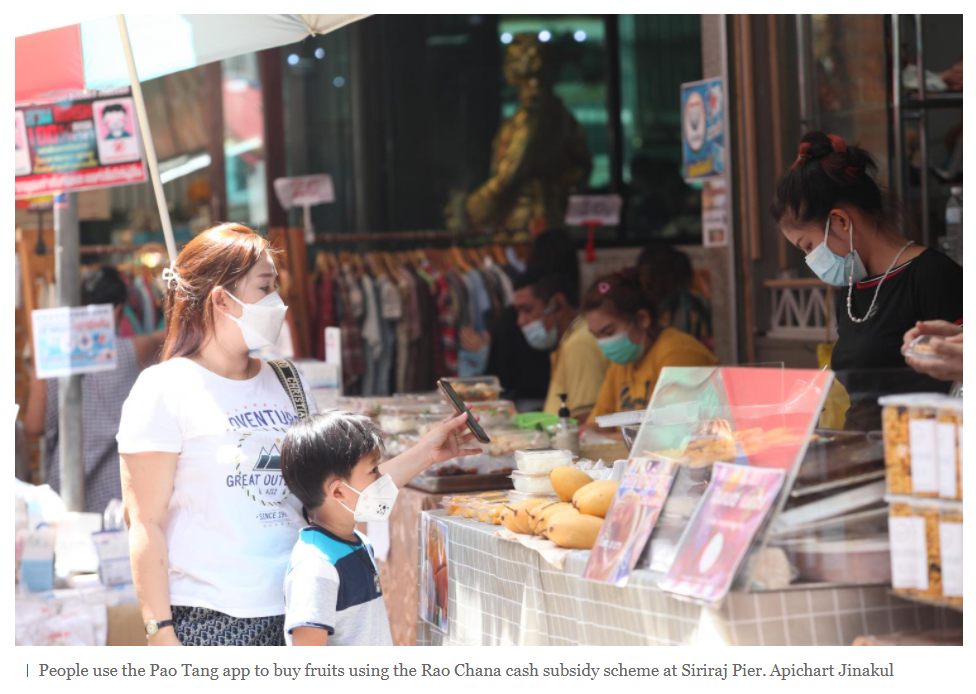Thailand: State pins hopes on fresh measures
The government has pinned its hopes on fresh measures to help alleviate hardships of people affected by the Covid-19 pandemic and to boost domestic consumption worth a combined total of 140 billion baht. The measures are scheduled to go before the cabinet today.
Deputy Prime Minister Supattanapong Punmeechaow said the fresh measures will play a vital role in boosting the Thai economy in the second half of this year.
The fresh measures include the “Ying Chai Ying Dai” (the more you spend, the more you get) scheme; the third phase of the co-payment subsidy scheme “Khon La Khrueng”; cash handouts to low-income earners who hold state welfare cards and vulnerable people who need special assistance such as the elderly, disabled persons, bed-ridden patients and those without smartphones.
Such aid schemes were approved in principle by the cabinet on May 5.
The “Ying Chai Ying Dai” scheme offers cashback e-vouchers to people to encourage them to purchase food, products and services through the government’s e-wallet.
Participants will receive cashback in their e-wallets at a rate of 10-15% of spending, with a maximum limit of 7,000 baht per person.
The e-voucher caps the amount it uses to calculate cashback at 5,000 baht daily, regardless of the daily amount spent.
The e-vouchers can be used from August until December and four million people are expected to participate in the scheme which focuses on middle and high-income earners.
For the third phase of the “Khon La Khrueng” co-payment scheme, the government will hand out 3,000-baht baht each to people to buy food and other products with the government paying for half of the purchase cost.
Some 31 million people are expected to participate in the scheme in which 1,500 baht will be paid in the third half and the remainder in the fourth quarter.
Meanwhile, around 13.65 million low-income earners who hold state welfare cards will receive 200 baht per person per month for six months from July to December.
Moreover, another 2.5 million vulnerable people who need special assistance will also receive the same amount in the same period.
“If the third wave of the Covid-19 infections can be contained within two months (June or July), the Thai economy is still likely to grow by 1.5-2.5% as forecast by the National Economic and Social Development Council (NESDC),” said the deputy prime minister.
However, he declined to discuss economic growth prospects this year, citing the uncertainty of the pandemic.
He only said this year’s economy will be primarily driven by exports which fared quite well in April as well as private investment.
Exports are maintaining healthy growth momentum, fetching more than US$20 billion (624 billion baht) for three consecutive months and recording the highest growth rate in 36 months in April.
The Commerce Ministry reported on May 25 that exports rose for a second consecutive month, jumping by 13.1% year-on-year to $21.4 billion in April, after 8.47% growth in March and a 2.59% contraction in February.
Meanwhile, shipments in the real sector (excluding gold, oil-related products and weaponry) continued to soar with a 25.7% expansion in April after a 12% rise in March. Imports also increased by 29.8% last month to $21.3 billion, resulting in a trade surplus of $182 million.
For the first four months of 2021, exports expanded by 4.78% to $85.6 billion, while imports rose by 13.9% to $84.9 billion, resulting in a trade surplus of $698 million.
Products that saw strong demand in April included agricultural and food products such as cassava products, rubber, fruit and vegetables, fresh, chilled and frozen chicken, palm oil, beverages, pet food and food seasonings.
Mr Supattanapong said private investment was showing an uptrend based on investment applications to the Board of Investment in the first quarter, which rose 80% from the same period a year earlier to 123.4 billion baht.
Source: https://www.bangkokpost.com/business/2124695/state-pins-hopes-on-fresh-measures


 English
English




